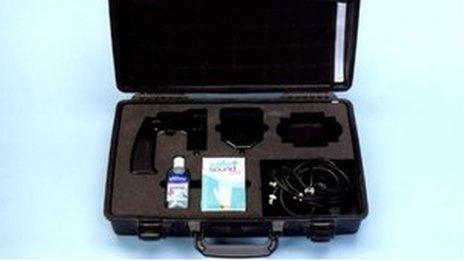Fake bomb detector husband jailed for three years
- Published
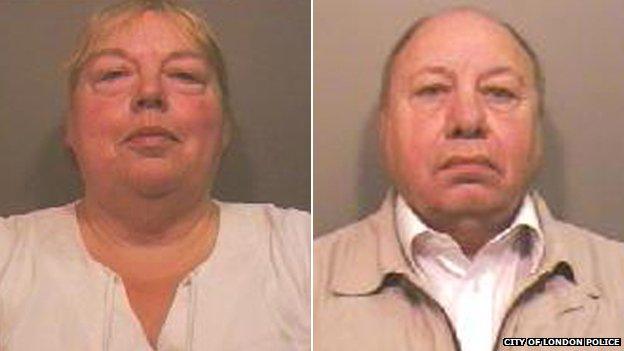
Joan Tree, 62, and Samuel Tree, 68, sold the devices to an agent who marketed them around the world
A man who claimed plastic devices he made in his garden shed could detect bombs and find missing Madeleine McCann has been jailed.
Samuel Tree, 68, was sentenced to three and a half years while his wife Joan, 62, received 300 hours community work.
Their plastic Alpha 6 cost just a few pounds but sold for thousands.
The couple are the last of a group of fraudsters - who marketed their devices to governments and conflict zones around the world - to be jailed.
The Trees were found guilty at the Old Bailey in August of making an article for use in a fraud between January 2007 and July 2012.
Sentencing them at London's Kingston Crown Court on Friday, judge Richard Marks QC described the scam as "a bizarre and fantastic proposition as to be almost akin to something out of Alice in Wonderland".
Police said they were driven by "personal greed" and were part of a criminal network worth £80m.

The Iraqi Interior Ministry says devices similar to the Trees' are still being used by police in the country
The Trees, of Dunstable, Bedfordshire, sold their worthless devices to an agent for £2,000 each, who then pitched them to other countries' authorities.
Their trial heard the devices were nothing more than plastic boxes with a free-rotating metal antenna.
Joan and Sam Tree made the Alpha 6 device in their garden shed in Dunstable in Bedfordshire.
Police were first alerted to the scam by a BBC Newsnight investigation into the production and sale of the Alpha 6.
'Golf ball detector'
Samuel Tree claimed the detectors could track down missing people if a photograph of them was placed inside - a technique he said he had used to search for Madeleine, who went missing as a toddler in 2007, and two other children.
The judge said his wife played a "much lesser role" in the operation, while the court heard she "would not have been involved" but for her husband.

Caroline Hawley, BBC world affairs correspondent, in court

The judge said Joan Tree came "as close as anyone could" to a prison sentence
From their suburban home, "Treetops", Samuel and Joan Tree were involved in an extraordinary international scam that reached several continents and, according to the police, put lives in danger.
The couple appeared relieved at the leniency of their sentences, with Mrs Tree seen mouthing "thank you" to the judge.
They embraced and broke down in tears following the hearing, which marks the end of a series of trials of several British fraudsters who made and marketed bogus detectors to trouble spots around the world.
The profits were huge. The police say they will now attempt to recover their ill-gotten gains.

Police believe the scam began in 1999 and made the couple around £2m.
The investigation found the Egyptian government placed a £1m order for the gadgets, while the Thai authorities are believed to have paid £25,000 for a single handle.
Officers said one Alpha 6, assembled out of plastic imported from China, was bought for £500,000.
The bogus contraptions were based on a novelty "golf ball detector" called the Gopher which sold for around $20 (£12) in the US.
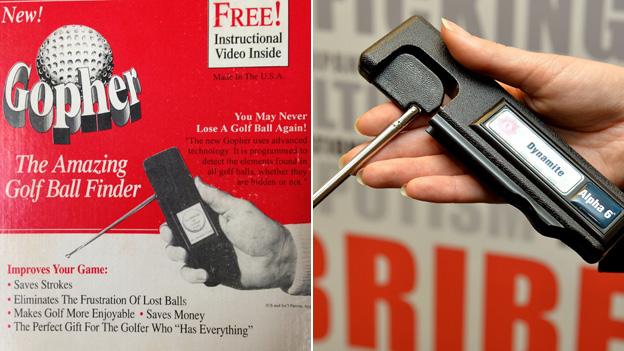
In the US, the FBI declared another substance detector based on the Gopher a "fraud"
The couple's jailing brings to an end a series of trials following a four-year police investigation into what officers described as a "criminal network that turned over more than £80m".
Businessmen James McCormick and Gary Bolton were jailed last year for versions of the scam, which saw the devices used at check points in Iraq.
Bolton claimed his GT200 device could detect anything from cash and land mines to ivory and tobacco.
He worked closely with the Trees after meeting them at an arms fair, police said.

The fraudsters and their devices
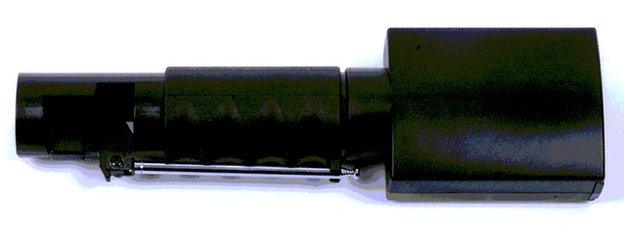
The ADE-651 (supposedly shorthand for Advanced Detection Equipment) was sold to Iraq, Niger and other Middle Eastern countries by Somerset-based businessman, James McCormick, who is now serving 10 years in jail. The Iraqis spent £53m ($85m) on the devices at around £5,000 ($8,034) a time. Some sold for as much as £25,000 ($40,178).
The GT200 "remote substance detector", sold by Gary Bolton mainly in Mexico, Thailand, the Middle East and Africa. The device retailed at £5,000 ($8,034) but the highest price it achieved was £500,000 ($803,000). Bolton was sentenced to seven years.
The Alpha 6 manufactured by Samuel and Joan Tree and sold to Egypt, Thailand and Mexico, usually at £2,000 ($3,213) per device. The highest sale price was £15,500 ($24,906) Tree was given three and a half years behind bars while his wife was ordered to do 300 hours unpaid community work.

Det Con Joanne Law, from City of London Police, said the couple were "driven by personal greed".
"It's been a long and complicated inquiry and we've worked with law enforcement officers all over the world to make sure we disrupt this type of crime," she told BBC News.
"It can be incredibly dangerous if you're asking people to use equipment to detect explosives in the belief that that equipment works.
"They're putting their lives at risk and they're also putting members of the public at risk."
DC Law, who led the investigation, said the devices appealed to authorities because it was "an officer's dream" to find such an apparently cost-effective way of detecting a range of substances.
Despite the convictions, versions of the fraudsters' devices are still being used in many countries, including on Iraqi checkpoints and to protect sites in Pakistan, according to the BBC world affairs correspondent Caroline Hawley.
Correction 7 October 2014: This report has been amended to clarify that Egypt placed a £1m order rather than ordering one million devices.
- Published3 October 2014
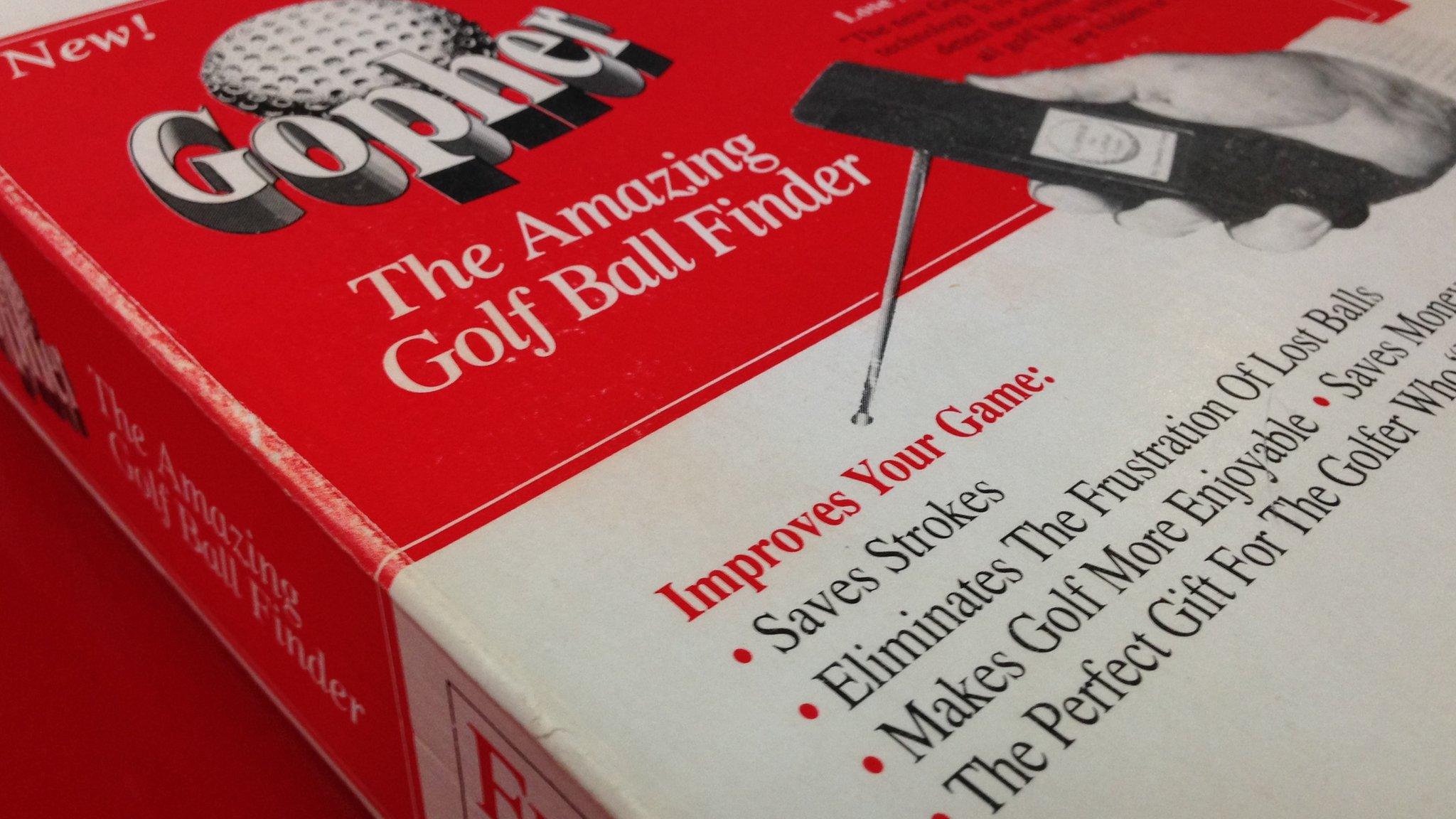
- Published23 April 2013
